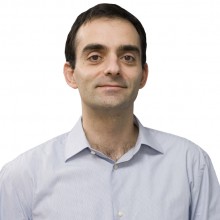By Kate Helm
In just 10 years, the cell phone has become ubiquitous. “It has changed human communication, sparking the mobile revolution that is sweeping the globe,” says Panayiotis Vitakis ’96, director of technology andoperations for Upstream, one of the largest mobile marketing companies in the world.

Panayiotis Vitakis ’96
“The mobile phone has grown into the most widely adopted electronic device in the world, easily surpassing TVs and PCs,” he says. “It has been transformed from a telephone to an extremely versatile and multifunctional personal device, offering a tremendous range of services. Everything that can become mobile will be mobile.”
Vitakis, a mechanical engineering graduate, oversees the technical execution of Upstream’s mobile marketing projects worldwide, the development of service platform software, and design and maintenance of the technology infrastructure. He likes the excitement of contributing to a company that innovates on a global scale from what, he says, is a very unlikely place – his native Greece.
Although Vitakis notes that the financial troubles there are far too complex to discuss in a short profile, he wrote in an article on Manylogue, a blog about Greek business that he cofounded, that the discussion about the need to reduce labor costs (i.e., salaries) in the private sector in order to increase Greece’s competitiveness is nonsense. He writes, “the way to compete at an international level is by delivering better, more innovative, more desirable or in some other way differentiated products or services, not cheaper. This is especially true for Greece, which does not have a mass manufacturing or heavy industry tradition.”
After earning a master’s degree in industrial engineering and management sciences from Northwestern University, Vitakis was drawn to information technology. He says lessons he learned in the broad range of liberal arts and engineering courses at Lafayette went a long way in preparing him for the challenge of delving into a career for which he wasn’t formally trained.
“Learning to think and solve problems like an engineer is a tremendous asset for any type of work or position,” says Vitakis, of Athens. “It was the foundation of knowledge, skills, and method of thinking that gave me the confidence to pursue a career in a very different field.”
When Vitakis first arrived at Lafayette, he was looking for a high-quality education and the unique experience of living and studying abroad. He discovered that learning not to think like an engineer was equally as important, as Arnold Offner, Hugel Professor of History, demonstrated.
“Through his passionate and often unconventional walk through history, [he] made me realize that, contrary to what engineers often think, there is more than one version of the truth,” says Vitakis. “I use that as a guiding principle when managing people and technology, both of which are a big part of what I do every day.”
Before joining Upstream as director of the mobile operators business unit, Vitakis was consulting manager for Icon InfoSystems, Chicago, Ill., and later project manager and pre-sales executive for OTEnet, a telecommunications company.
Vitakis considers his time at Lafayette as more than just an education; it was a golden opportunity to learn from mistakes before they had severe consequences. For instance, he put off his honors thesis, which ended in a “generous” grade of incomplete, allowing him to salvage the project with an acceptable grade in the end.
“It made me realize that big things require big commitments. Half-measures don’t get the job done,” he says.
